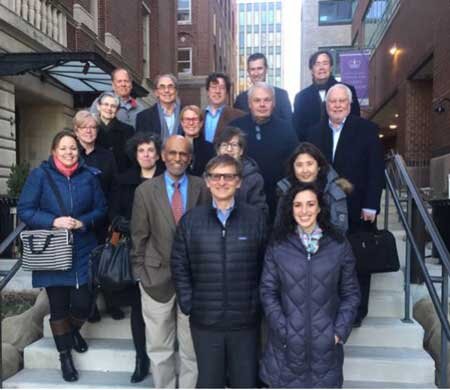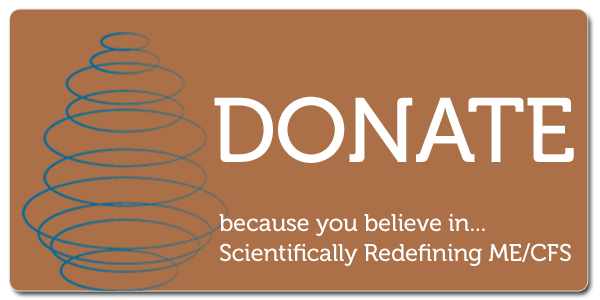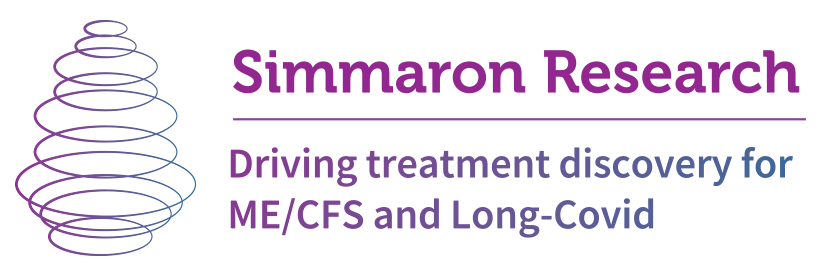Ian Lipkin & Simmaron to Collaborate in New NIH ME/CFS Research Center
"These important grants will provide a strong foundation for expanding research in ME/CFS, and lead to knowledge about the causes and ways to treat people affected by this mysterious, heartbreaking, and debilitating disease,"Dr. Francis S. Collins, Director of the NIH
Simmaron to Collaborate in Columbia's Landmark NIH Center of Excellence
 Dr. Ian Lipkin and the Center for Infection and Immunity at Columbia University have been awarded one of three NIH grants to produce a collaborative research center dedicated to ME/CFS. Simmaron's Scientific Advisor Dr. Daniel Peterson is a clinical collaborator on the team.This collaboration is the culmination of a 6-year partnership between Columbia, Dr. Peterson and Simmaron Research, among others, that have produced 6 peer-reviewed publications that have identified immune changes leading to new profiles of patient subsets.The total research grant package - $35 million for three research centers and a data center over a 5-year period - is likely the largest single infusion of NIH funding into ME/CFS research ever. The highly competitive NIH process involved 10 grant applications from across the U.S.In addition to Columbia, the three research centers - the first dedicated NIH funded research Centers in over 15 years - include a Cornell Team lead by Dr. Maureen Hanson which will focus on the effects of exercise on the brain, the immune system and inflammation. Another study lead by Derya Unutmaz of the Jackson Labs will determine how the immune system, the microbiome and the metabolism interact to cause ME/CFS.
Dr. Ian Lipkin and the Center for Infection and Immunity at Columbia University have been awarded one of three NIH grants to produce a collaborative research center dedicated to ME/CFS. Simmaron's Scientific Advisor Dr. Daniel Peterson is a clinical collaborator on the team.This collaboration is the culmination of a 6-year partnership between Columbia, Dr. Peterson and Simmaron Research, among others, that have produced 6 peer-reviewed publications that have identified immune changes leading to new profiles of patient subsets.The total research grant package - $35 million for three research centers and a data center over a 5-year period - is likely the largest single infusion of NIH funding into ME/CFS research ever. The highly competitive NIH process involved 10 grant applications from across the U.S.In addition to Columbia, the three research centers - the first dedicated NIH funded research Centers in over 15 years - include a Cornell Team lead by Dr. Maureen Hanson which will focus on the effects of exercise on the brain, the immune system and inflammation. Another study lead by Derya Unutmaz of the Jackson Labs will determine how the immune system, the microbiome and the metabolism interact to cause ME/CFS.
Ian Lipkin - Pathogen Hunter
Nobody is better at pathogen research than Ian Lipkin, and no subject is more important than how a seemingly innocuous infection turned into a chronic, often debilitating and life-long illness for many.If anyone is well-situated to explore that question, it's Dr. Lipkin. A key innovator in the pathogen field, Dr. Lipkin was the first to show that genetic testing could discover new pathogens to science. Dr. Lipkin invented MassTag PCR, the first panmicrobial microarray, and was the first to use deep sequencing in pathogen discovery.In 2014 Lipkin's lab received a $31 million, five year NIH grant to establish The Center for Research in Diagnostics and Discovery (CRDD). Although the CRDD is not specific to any disease, one of its key goals is a subject dear to many ME/CFS patients' hearts: understanding why infectious agents create enormous problems in some people but not in others. For example, identifying the "host factors" which turn a usually recoverable infection in a person with ME/CFS into a "never-ending flu" will be critical in learning how to turn the clock back in ME/CFS.More recently Dr. Lipkin's new method of viral analysis was described as a breakthrough for precision medicine. Acclaimed as one of ten world-changing ideas of 2015 by the Scientific American, the new VirCapSeq-VERT test is able characterize the genetic composition of any virus in any bodily fluid quickly and cheaply "with exquisite sensitivity and accuracy". Given the heterogeneity probably present in ME/CFS, Dr. Lipkin's focus on developing tools for precision medicine - which focuses on identifying unique factors in each individual - is probably going to be helpful indeed.In short, Dr. Lipkin's extensive research record, his interest in the effects pathogens have on the body, and his ability to keep himself and his lab on the cutting-edge of science made him an obvious choice to host an ME/CFS research center.
Center for Solutions for Myalgic Encephalomyelitis/ Chronic Fatigue Syndrome (CfS for ME/CFS)
"We will leverage every technological platform possible to solve ME/CFS. We will get there." Ian Lipkin
Lipkin's goal is a simple one - to come up with treatments as soon as possible. During a telephone conversation, Lipkin abjured the idea of an "ME/CFS research center"; he's not building a center to research ME/CFS, he said, he's building a center to find solutions for ME/CFS - hence the name "Center for Solutions for Myalgic Encephalomyelitis/ Chronic Fatigue Syndrome (CfS for ME/CFS)". He anticipated that a variety of treatments are going to be needed for different people.The new Center has three main aims - understanding how pathogens affect immune functioning and cause disease in ME/CFS, understanding links to the microbiome and host interactions, and developing a mobile app to better understand the symptoms and stressors in this disease.Samples may be a problem for some but they're not a stumbling block for Ian Lipkin. He and his colleagues have built a large biobank with the support of the NIH, the Chronic Fatigue Initiative and crowdfunded Microbe Discovery Project that includes feces, saliva and blood. What he hasn't had is the funding to test them to the extent that he's wanted to.Now he has some of the money he needs carry out what amounts to his grand plan to study ME/CFS. Ultimately Lipkin hopes to figure out how an infectious trigger managed to wreak so much havoc on many people with ME/CFS.Lipkin's team will be using his VirCapSeq-VERT technology to get a snapshot of all the viruses a person has been exposed to. He'll be using technology developed using a grant from the Bill and Melinda Gates Foundation to identify the bacteria present. He'll also be assessing fungi.Along with immune functioning he'll be looking at autoantibodies, a hot topic right now. Fluge and Mella are pursuing autoantibodies in their Rituximab work, and autoantibodies appear to play major role in some cases of postural orthostatic intolerance syndrome (POTS) - a condition many people with ME/CFS have. Just last year, a German study Fluge and Mella collaborated in, found autoantibodies to acetylcholine and beta-adrenergic receptors in about 30% of ME/CFS patients. The presence of these antibodies could help explain why Rituximab is helpful in some.Noting the work Mark Davis of Stanford has done regarding T and B-cell responses, Lipkin said he hoped to work with him to use microarrays to try and determine what those cells are responding to in ME/CFS. We haven't thought of Lipkin as a metabolomics researcher, but he's now engaged in no less than three metabolomics projects with Oliver Fiehn of the University of California Davis: a Simmaron Research Foundation cerebrospinal fluid project with Dan Peterson, a blood metabolomics study, and with the new research center, the first ever exercise metabolomics study.Lipkin described metabolomics as a way to peer inside the body and see that chemicals that result from the body's functioning. Reduced levels of neurotransmitters, for instance, could mean a balky nervous system, high levels of other factors could be suppressing the immune system, reduced levels of energy building blocks or by-products could reveal an energetic deficit affecting many functions. Metabolomics will also help him determine if the metabolites from the bacteria in our bodies could be affecting immune and central nervous system functioning.The team will also analyze the metabolites and gene expression before and after exercise tolerance tests and an orthostatic intolerance test called the Lean Test, developed by NASA, which Dr. Bateman and the Bateman-Horne Center began piloting in an ME/CFS study. If metabolism is indeed a key problem in ME/CFS, we can expect the already striking metabolic findings in ME/CFS to get considerably more striking as exercise and standing tests put ME/CFS patients metabolism to the test.Dana March and Tony Komaroff will also develop a mobile app called myME/CFS that will allow them to track symptoms in response to stressors and treatments. It will allow those with the disease to chart the course of their illness, and will allow clinicians and researchers to use these valuable data for insights. This will supplement work the team will be doing in mining existing databases for subtypes and risk factors.Lipkin has more projects than he has money to fund them. During a Directors' meeting at the NIH Lipkin pressed Dr. Koroshetz on the need for more funding for the research centers, but talking to him on the phone he said firmly, "We will get there." He said his team would leverage every resource he can, and exploit every technological platform possible to solve ME/CFS.
We haven't thought of Lipkin as a metabolomics researcher, but he's now engaged in no less than three metabolomics projects with Oliver Fiehn of the University of California Davis: a Simmaron Research Foundation cerebrospinal fluid project with Dan Peterson, a blood metabolomics study, and with the new research center, the first ever exercise metabolomics study.Lipkin described metabolomics as a way to peer inside the body and see that chemicals that result from the body's functioning. Reduced levels of neurotransmitters, for instance, could mean a balky nervous system, high levels of other factors could be suppressing the immune system, reduced levels of energy building blocks or by-products could reveal an energetic deficit affecting many functions. Metabolomics will also help him determine if the metabolites from the bacteria in our bodies could be affecting immune and central nervous system functioning.The team will also analyze the metabolites and gene expression before and after exercise tolerance tests and an orthostatic intolerance test called the Lean Test, developed by NASA, which Dr. Bateman and the Bateman-Horne Center began piloting in an ME/CFS study. If metabolism is indeed a key problem in ME/CFS, we can expect the already striking metabolic findings in ME/CFS to get considerably more striking as exercise and standing tests put ME/CFS patients metabolism to the test.Dana March and Tony Komaroff will also develop a mobile app called myME/CFS that will allow them to track symptoms in response to stressors and treatments. It will allow those with the disease to chart the course of their illness, and will allow clinicians and researchers to use these valuable data for insights. This will supplement work the team will be doing in mining existing databases for subtypes and risk factors.Lipkin has more projects than he has money to fund them. During a Directors' meeting at the NIH Lipkin pressed Dr. Koroshetz on the need for more funding for the research centers, but talking to him on the phone he said firmly, "We will get there." He said his team would leverage every resource he can, and exploit every technological platform possible to solve ME/CFS.
Ian Lipkin, Dr. Peterson and the Simmaron Research Foundation
Dr. Lipkin's interest in chronic fatigue syndrome (ME/CFS) - and his connection with Dr. Peterson - goes back decades. His first acquaintance with the disease, interestingly enough, came from one of Dr. Peterson's patients way back in 1984. Dr. Lipkin talked about that and his search for more resources in a 2014 video.[embed]https://www.youtube.com/watch?v=z_v3bfbBupA&t=30s[/embed]Since Dr. Lipkin re-emerged in the ME/CFS field through the XMRV studies, Dr. Lipkin and the Simmaron Research Foundation have collaborated on several ground-breaking studies. The Lipkin/Hornig blood cytokine study identified, for the first time, evidence of dramatic immune upregulation early in the disease followed by what appears to be an equally dramatic period of immune exhaustion.A landmark cerebral spinal fluid study using Dr. Peterson's samples found the same.Next, Dr. Peterson's years of experience informed another spinal fluid analysis which, for the first time, identified an "atypical" subset of ME/CFS patients who had dramatically different immune findings. A follow-on cerebral spinal fluid study examining metabolomics and immune factors is underway by Simmaron and Columbia.The Atypical Subset Studyhttp://simmaronresearch.com/2017/04/petersons-atypical-chronic-fatigue-syndrome-me-cfs/
Advocate and Messenger
Dr. Lipkin is one of a very few ME/CFS researchers to aggressively advocate for this disease, and he acknowledged the ME/CFS community for its work.
“The pace of research has increased, thanks largely to advocacy by the ME/CFS community and the generous support of the Hutchins Family Foundation. We are grateful to NIH for recognizing the potential of this ME/CFS CRC to capitalize on this momentum, bringing together the very best clinical and scientific talent and technology to do work needed to turn a corner on this disease.” Ian Lipkin, MD
The Lipkin team will also connect with the key players in the digital online media (The Solve ME/CFS Initiative, ME Action and the Microbiome Project) to disseminate the group's work, engage patients and break up the stigma surrounding ME/CFS.
“One of our goals is to dissolve barriers between scientists, clinicians, individuals with ME/CFS, and advocates. By connecting with the global digital ME/CFS community, we aim to increase the visibility and reduce the stigma of what many have described as an invisible population.” Dana March, assistant professor of Epidemiology at the Mailman School and deputy director and administrator of CfS for ME/CFS.
Simmaron Research is proud of its longstanding collaboration with Columbia, and we congratulate all of the collaborators, patients and advocates who worked hard for years to make this landmark investment by NIH in ME/CFS research centers happen.
